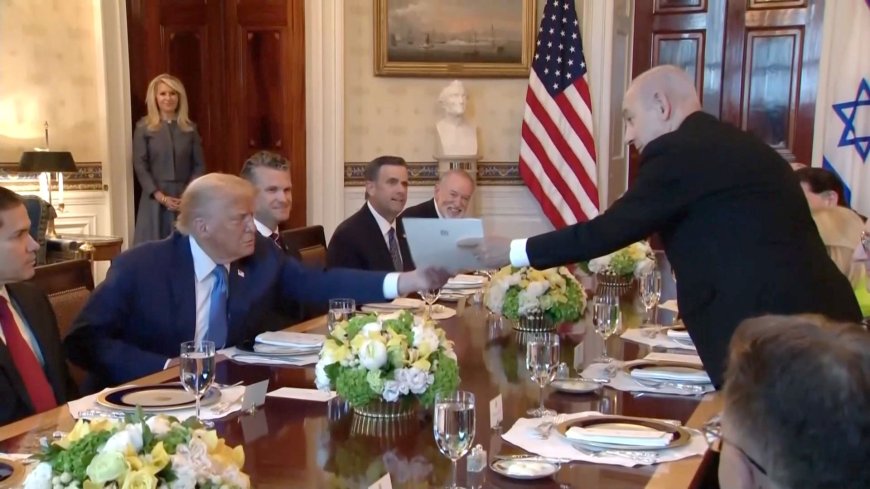Netanyahu Presents Trump With Nobel Peace Prize Nomination for Abraham Accords
Israeli PM Benjamin Netanyahu has officially nominated Donald Trump for the Nobel Peace Prize, crediting his historic role in the Abraham Accords. Here's what the nomination means for global diplomacy.

Netanyahu's Nobel Nomination for Trump: A Diplomatic Gesture with Global Implications
By Ronald Kapper
In a rare and symbolic moment that has ignited political discourse across continents, Israeli Prime Minister Benjamin Netanyahu has formally nominated former U.S. President Donald J. Trump for the 2026 Nobel Peace Prize. The nomination, delivered in writing to the Nobel Committee and then presented personally to Trump during a private dinner in Washington, credits Trump’s pivotal role in facilitating the Abraham Accords — a set of peace agreements that normalized diplomatic relations between Israel and several Arab nations.
The Historical Weight Behind the Nomination
The Abraham Accords, signed in 2020 during Trump’s presidency, marked a watershed in Middle East diplomacy. These agreements led to the normalization of ties between Israel and the United Arab Emirates, Bahrain, Morocco, and later, Sudan. It was the first time in over 25 years that Arab states had formally recognized Israel without prior resolution of the Israeli-Palestinian conflict — a longstanding precondition in earlier peace talks.
Netanyahu’s nomination letter emphasized that Trump’s diplomacy represented a “historic paradigm shift,” replacing decades of hostility with “strategic cooperation and mutual understanding.” According to sources familiar with the letter, Netanyahu praised Trump for “his leadership, courage, and unwavering commitment to reshaping the Middle East’s geopolitical landscape.”
Watch the Video here :
Why the Nobel Peace Prize?
The Nobel Peace Prize, awarded annually by the Norwegian Nobel Committee, recognizes outstanding contributions to peace, reconciliation, and international cooperation. By nominating Trump, Netanyahu aligns the Abraham Accords with historic Nobel-worthy achievements like the Camp David Accords brokered by U.S. President Jimmy Carter or the Oslo Accords, for which leaders like Yitzhak Rabin, Shimon Peres, and Yasser Arafat were once honored.
This isn’t the first time Trump’s foreign policy has been linked to Nobel nominations. In previous years, lawmakers from Europe and the U.S. had submitted similar recommendations based on his outreach to North Korea and efforts in fostering Arab-Israeli cooperation. However, this is the first time a head of state, and particularly the Israeli Prime Minister, has made such a direct appeal to the Nobel Committee.
The Timing and Political Optics
The nomination arrives at a politically significant moment. Netanyahu is under pressure at home due to the ongoing Gaza conflict and judicial reform protests, while Trump is once again the presumptive Republican nominee for the 2024 U.S. Presidential election. Observers have noted that this move not only honors Trump’s diplomatic legacy but may also reinforce the strategic alliance between the U.S. Republican base and Israel’s current leadership.
Yet, Netanyahu’s decision also sends a message beyond politics. It underscores a shared belief in the long-term benefits of the Abraham Accords — economically, diplomatically, and geopolitically — particularly amid current tensions in the Middle East.
A Closer Look at the Abraham Accords
The Abraham Accords fundamentally altered the regional power dynamics by fostering direct relationships between Israel and Sunni Arab states. These accords facilitated bilateral trade, tourism, and joint investments in technology, energy, and defense. More importantly, they created a new platform for countering Iran’s growing influence in the region, drawing a strategic arc between Jerusalem, Abu Dhabi, Manama, and Washington.
Since the signing, Israeli technology firms have entered joint ventures with Emirati partners. Direct flights between Tel Aviv and Arab capitals have become routine. Thousands of tourists have exchanged visits, and security cooperation has increased between intelligence agencies. The accords have also inspired secondary diplomatic engagements — such as trilateral agreements on food security and green energy.
Reactions from the International Community
Reactions to Netanyahu’s nomination of Trump have been mixed. Supporters argue that Trump's mediation bypassed decades of stagnant peace negotiations and created tangible, positive outcomes in a volatile region. They credit him for rejecting conventional wisdom and achieving what multiple U.S. administrations could not.
Critics, however, point to unresolved issues — especially the Israeli-Palestinian conflict — and argue that the accords sidestepped rather than solved the core problem. Others fear that using the Nobel Peace Prize as a tool for recognizing strategic diplomacy may dilute its moral and humanitarian legacy.
Nonetheless, many international observers agree that the Abraham Accords were a monumental shift in Middle East diplomacy, regardless of how they are politically interpreted.
Trump’s Response and What’s Next
Trump, visibly moved during the dinner where Netanyahu presented him with a framed copy of the nomination letter, expressed gratitude and pride. “This means more to me than you’ll ever know,” he said, acknowledging the depth of the gesture from a longstanding ally.
The Nobel Peace Prize process is highly confidential. While nominations are accepted from heads of state, parliamentarians, professors, and past laureates, the final decision rests with the five-member Norwegian Nobel Committee. Selections for the 2026 award will be announced in October 2026, with deliberations beginning early next year.
Final Thoughts
Whether or not Trump receives the Nobel Peace Prize, Netanyahu’s nomination is undeniably symbolic. It recognizes a chapter of diplomacy that shifted entrenched alliances and opened new possibilities in one of the world’s most conflict-prone regions. For Trump, the nomination may add further weight to his foreign policy legacy. For Netanyahu, it serves as a reminder of one of the rare periods of stability in recent Israeli diplomatic history.
Regardless of political leanings, this nomination invites the world to reassess what modern peacemaking looks like — and whether unconventional paths can lead to lasting change.











